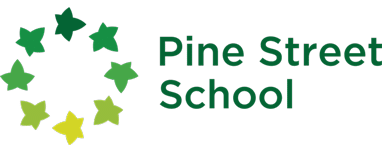
Academics
Junior Kindergarten (Fours)
Pine Street School’s Junior Kindergarten program is designed to prepare our 4-year-olds for the dynamic, collaborative experience of our play-based and inquiry-based IB/PYP (International Baccalaureate / Primary Years Program).
Our teachers, all of whom are native speakers of the target language as well as English-proficient, are strategic facilitators who collaborate with and empower our young students to question and problem solve, to take action and reflect.
Junior Kindergarteners learn to adapt to new schedules, with frequent art, music, physical education and more frequent technology classes.
Junior Kindergarten maintains the warm, nurturing approach of preschool while preparing students for the challenges of our Elementary School academic program.
They continue to use Montessori materials, but dedicate more time to teacher-facilitated group activities, developing inquiry with their peers and practicing sharing and listening in more sophisticated contexts.
The Junior Kindergarten phase is an important one, as the brain makes huge advances, and both intellectualand social skills accelerate and mature. The teachers in this program are prepared to capitalize on this uniquely powerful moment with individualized instruction that challenges every student and invites the fullest possible expression of interest and talent.
Our 4-year-olds are ready to engage in more advanced exploration of the surrounding community as part of our School Without Walls approach to learning. Field trips and other educational outings become more frequent, and students begin to learn how to use the vast, rich resources of the city as a curriculum tool.
Junior Kindergartners enjoy mentorship by the Kindergarten and Upper Elementary students with daily interactions and exposure. It is an exciting community of growth and exploration, with inspiration all around and constant invitations to develop new skills and friendships.
Our Junior Kindergarten Curriculum
Language Arts
Students regularly engage in regular reflection on their work. They actively participate in the four annual conferences: parent-teacher-student, parent-teacher and student-led. They are confident sharing what they have learned and discussing openly the challenges and growth they are experiencing. All of this information is reflected in the student report cards.
Students engage in a rich array of language experiences that develop reading and writing readiness. All aspects of speaking, listening, reading, and writing receive emphasis. Teachers use pre-reading and writing tools: including a vast library of children’s literature in the form of books and electronic resources to develop a love of reading, comprehension skills, and creativity. Structured and unstructured activities develop observation and listening skills, labeling and defining skills, and fine motor and gross motor skills.
Mathematics
A variety of materials are used to develop mathematical thinking, counting, one-to-one correspondence, and a keen sense of numeracy. Number and geometric patterning activities such as graphing, charting, and games, and collections reinforce number skills. They develop problem-solving abilities by engaging in real life mathematical situations such as counting, sharing, sorting, and classifying objects in the classroom.
Social Studies
Junior Kindergarten students learn about the concept of community, become contributing members of a diverse classroom, and develop a respect for our natural environment. Students focus on themselves, their families, the school community, and places they have visited.
Science
Awareness and appreciation of science are developed through a focus on hands-on investigations. Students observe, predict, sequence, analyze, and apply knowledge they have learned. Units such as dinosaurs, the five senses, magnets, seasons, and the holidays are integrated with language arts, social studies, and mathematics.
Mandarin Chinese or Spanish
Dual Language instruction in Mandarin Chinese or Spanish in Junior Kindergarten build on language and cultural fluency. Students hear language in songs, stories, and instructions, and they start to understand what it means. They speak the languages more frequently as they areat an age when they can hear and mimic accents more accurately. Material is presented through games, songs, stories, and kinesthetic activities.
Art & Music
At Pine Street School, we believe that music and art should play integral roles in every student's learning. Preschoolers enjoy regular weekly time with our school’s Music Teacher exploring instruments, musical genres, cultures, composition, and music theory.
They also work regularly with our school’s Art Teacher learning how to use the tools, materials and approaches associated with various forms of artistic expression. These art experiences are often interlaced with the curriculum in special “artist studies” in which students learn about specific artists, their cultural influences and their unique styles and techniques. Preschoolers then replicate those approaches and works as a way to develop a deeper understanding of the genre.
Physical Education
Fundamental skills (e.g., traveling, jumping and landing, throwing and catching, balancing) and basic movement concepts (spatial awareness, effort, andrelationships) form the basis of the curriculum. Games are for enjoyment while allowing for the exploration of various skills including movement, listening, and sequencing of directions. Social skills such as sharing, courtesy, sportsmanship, and honesty are also stressed.
Technology
Junior Kindergarten students are able to take advantage of the Pine Street School Design Lab, beginning an exploration of technology and its connections to creative processes. Early exposure to coding, robotics, circuitry and uses for tablets begins at this age.
Social Emotional Development
Children grow in confidence and self-awareness as they develop the ability to work productively on their own and as members of a group. Classroom routines, activities, and expectations are designed to help children grow in their understanding of, and appreciation for, the diverse backgrounds, interests, and talents of others. Our goal is to have the children in Junior Kindergarten feel confident within their community to have them build a cohesive classroom community.
Parents and caregivers are invited to participate in the Junior Kindergarten curriculum by joining in field trips, sharing family and cultural traditions, and attending special class activities.

